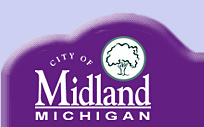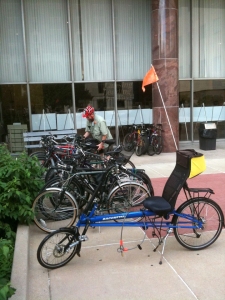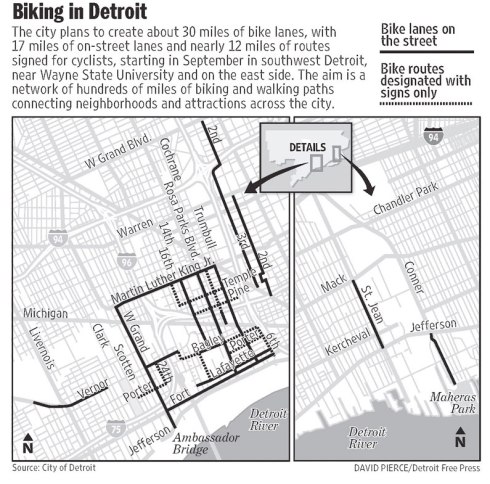You are currently browsing the tag archive for the ‘Non motorized plans’ tag.
 On Monday, October 4, Berkley City Council voted unanimously to formally adopt a policy in support of Complete Streets, and directed the Berkley Planning Commission to begin preparing a Master Plan amendment that updates and expands the multimodal transportation section. Berkley’s policy becomes the ninth Complete Streets resolution adopted in Michigan, accompanied by two communities that have passed ordinances.
On Monday, October 4, Berkley City Council voted unanimously to formally adopt a policy in support of Complete Streets, and directed the Berkley Planning Commission to begin preparing a Master Plan amendment that updates and expands the multimodal transportation section. Berkley’s policy becomes the ninth Complete Streets resolution adopted in Michigan, accompanied by two communities that have passed ordinances.
At the previous Council meeting on September 20, 2010, Berkley City Council held a work session to discuss Complete Streets. Mr. Brad Strader, President and Managing Partner of LSL Planning, presented an overview to Council and the public. The Council then engaged in an informative discussion with city administration, staff, and residents from the community including members of the Berkley Environmental Advisory Committee, who submitted a formal letter in support of Complete Streets.
Councilmember Steve Baker, who has worked on Complete Streets with Berkley residents, business owners, and members of various committees and boards over the past six months, said his motivation is to make Berkley an even more desirable place to live, work, and play. “Berkley is a very walkable community, and this policy is a step forward as we create an even more inviting sense of ‘place’ for our residents and visitors of all ages and abilities.”
“This is not a requirement for us to rip up existing roads and start over,” Baker said. “A Complete Streets policy, and our upcoming Master Plan amendments, is a win-win for Berkley. This better positions Berkley to compete for scarce funding resources and grants, and it helps to further enhance the quality of life for our residents, businesses, and visitors.”
The Marquette Area Bikeability Committee in cooperation with the Marquette County Complete Streets Program welcomes all area residents to join an upcoming discussion regarding complete streets.
Complete Streets are roadways that are designed and maintained with all users in mind, including motorists, bicyclists, public transit vehicles, and pedestrians.
The event will be held on October 13th at 6:30PM in the Citizens Forum room at Lakeview Arena. This free presentation will cover basic information regarding Complete Streets and include a presentation of the proposed City of Marquette plan with complete street corridors and improvement opportunities. There will be time for public comment and public feedback, suggestions, and questions are welcomed and encouraged. If you are interested in attending this event please contact Dayna Keranen, Community Development Coordinator at the Lake Superior Community Partnership; 906-226-6591.
Please consider attending and providing feedback and suggestions with regard to safe commuting for all area residents.
For more information please visit our Facebook page
 On May 25, 2010, the Midland Planning Commission voted 7-0 to approve a Complete Streets policy. The Non-motorized Transportation Improvement Advisory Committee first outlined the policy, and then recommended it to the Planning Commission. The policy does not specify any one specific road design or financing, but will require city planners to design, operate and maintain streets that are safe and accessible for all users.
On May 25, 2010, the Midland Planning Commission voted 7-0 to approve a Complete Streets policy. The Non-motorized Transportation Improvement Advisory Committee first outlined the policy, and then recommended it to the Planning Commission. The policy does not specify any one specific road design or financing, but will require city planners to design, operate and maintain streets that are safe and accessible for all users.
More information about the Non-motorized Transportation Improvement Plan can be found here.
Good work, Midland!
As published in the Detroit Free Press on April 8/2010.
Detroit is embarking on an ambitious plan to create bike lanes on roads across town, giving cyclists like Jon Koller designated space for riding as city leaders and community groups rethink street and land use in a shrinking city.
It’s a big change. Although the city is starting with about 30 miles in a handful of neighborhoods this year, there eventually could be as many as 400 miles of bike lanes in Detroit.
“I think it’s going to encourage more people to get out there and take biking as a serious form of transportation,” said Koller, 25, who lives in the city’s Corktown neighborhood and commutes by bike to Wayne State University, where he’s a doctoral student in transportation engineering.
Read the rest of this story at www.freep.com
 This article originally appeared in the AARP Bulletin Today on March 1, 2010.
This article originally appeared in the AARP Bulletin Today on March 1, 2010.
Can pedestrians, cyclists and automobiles share safe streets?
Cyclists and walkers won a major victory in Lansing last year. After thousands of citizens petitioned for a ballot initiative, the Lansing city council agreed to invest about $400,000 a year to make streets safer for non-motorists.
As a next step, volunteers will conduct walkability surveys to identify areas that need work. Kafantaris said she is looking for volunteers for the Lansing survey and is building a network of activists in other cities. To join the effort, e-mail [email protected].
Elsewhere in the state: A group called Safe and Active Genesee for Everyone is pushing for a more accessible transportation network. Traverse City’s new infrastructure strategy emphasizes sidewalks and bike lanes. Marquette narrowed a downtown portion of Wright Street from four lanes to two with a center lane and four-foot bike lanes on both sides.
At the state level, lawmakers approved a 2009-10 budget last year that encourages the Department of Transportation to adopt complete streets policies and assist local governments in doing the same. Supporters hope the legislature will enact stronger legislation this year.

Funding to be awarded to five health departments in 2010 and an additional five in 2011
This Complete Streets Policy Request for Applications is issued by the Cardiovascular Health, Nutrition and Physical Activity Section (CVHNPA) in the Division of Chronic Disease and Injury Control at the Michigan Department of Community Health (MDCH). The purpose of this grant opportunity is to fund local health departments and one of their communities that are ready to work on passing a local Complete Streets ordinance. This is to support Michigan in having safer and connected communities in Michigan, increase assess to daily physical activity for transportation and recreation, and increase the physical activity levels in Michigan to reduce chronic disease and obesity in communities.
The CVHNPA Section will provide funding for up to five local health departments to work with a community within their jurisdiction that are interested in implementing a complete streets ordinance in a city, township, or village. Funding will be provided to five health departments in 2010 and an additional five in 2011.
The funding for this project is from a grant awarded to the CVHNPA Section at the Michigan Department of Community Health from the Centers for Disease Control and Prevention American Recovery & Reinvest Act (ARRA) funding.
Yet another Michigan city has recognized the link between infrastructure and livability, and stepped up it’s commitment to safe infrastructure for walking and biking. Yesterday we heard from Traverse City Mayor Chris Bzdok, who wrote to inform us that the City adopted a new infrastructure policy in September — one that includes an emphasis on complete streets. The policy makes an expressed bias in favor of sidewalk and bikeway construction. See more over at http://www.ci.traverse-city.mi.us/Policy/InfrastructureStrategyPolicy.pdf
In addition to this new infrastructure policy, the City will dedicate 10% of its infrastructure budget to sidewalks, bikeways and other people-friendly infrastructure, the highest known percentage commitment of any municipality in the state of Michigan.
Mayor Bzdok’s commitment to these issues is sincere – he can often be seen riding his bicycle to work and to City Hall. Meanwhile, his administration has additional complete streets-related goals for the City, outlined in full at www.planfortc.com.
We could go on about these goals, but this quote says it best:
“[We desire s]treets that serve not only cars, but also bicycles and pedestrians. It means bike lanes, sidewalks, and safe places for people to cross our major roads. It means solving the problems on Division Street. It means re-striping Eighth Street so people can ride their bicycles safely between Boardman and Central neighborhoods. It means installing or improving pedestrian crossings over US-31 at Fourteenth Street, Eleventh Street, Randolph, Grandview Parkway, Oak Street, Hall Street, Garfield, Eighth Street, and Parsons. It means providing safe routes to school.
In part, this is an equity issue. Not everyone has a car, or is in a position to drive. They deserve a way to get around town, too. In part, this is a plan for reducing traffic in our city. If we don’t make it safe and convenient for people to travel on foot or bicycle, how can we ever expect them to get out of their cars? It’s also about being a desirable city. The most sought-after places around the country provide for walking and biking throughout their city limits, and residents and visitors in those cities do just that. It’s time we get with the program.”
Well put, Mayor Bzdok. Thanks for your leadership on these important issues!
Below is a map of current Complete Streets policies and nonmotorized plans that are in place throughout Michigan. Click the icons below for links to more information on each item. Please contact us if your community has a plan or policy to add.

The bike rack was overflowing in front of City Hall as over 60 Complete Streets supporters came out to testify before City Council on August 10, 2009.
The Lansing City Council voted unanimously on Monday night to adopt a Complete Streets and Non-Motorized Plan Ordinance. This is a big victory for cyclists and pedestrians in Lansing, and for the Complete Streets movement in Michigan. Lansing becomes the first municipality in the State of Michigan to pass a Complete Streets ordinance, and joins a host of other communities across the state in committing to develop a non-motorized plan.
The effort to pass the ordinance was organized by the Walk and Bike Lansing! Task Force. Led by the Mid-Michigan Environmental Action Council, the task force is composed of a diverse group of community and state partners, including LMB and MEC. The initiative came to City Council by way of a signature drive, through which volunteers collected over 4,520 signatures of registered Lansing voters. Another 90 letters of support and 60 public comments at a recent Council meeting didn’t hurt, either.
There’s more information on this milestone at the Walk and Bike Lansing! website, but in summary, this ordinance:
- Requires the City of Lansing to adopt a Non- Motorized Network Plan.
- The Non-Motorized Network Plan would include, at a minimum, accommodations for accessibility, sidewalks, curb ramps and cuts, trails and pathways, signage, and bike lanes, and shall incorporate the principles of Complete Streets and maximize walkable and bikeable streets within the City.
- To the extent financially feasible, future construction or reconstruction of City rights-of- way or any parts thereof shall be in conformity with the Non-Motorized Network Plan.
- Sets a goal to adequately funding walk- and bike-friendly infrastructure. (The City of Lansing currently spends 2% to 3% for non-motorized facilities. The ordinance sets a goal of 5% for future budget years).
- Require an update of the Non-Motorized Network Plan every five years from the date of adoption.
Congratulations, Lansing! Here’s to hoping other Michigan communities and road agencies follow your lead!
















